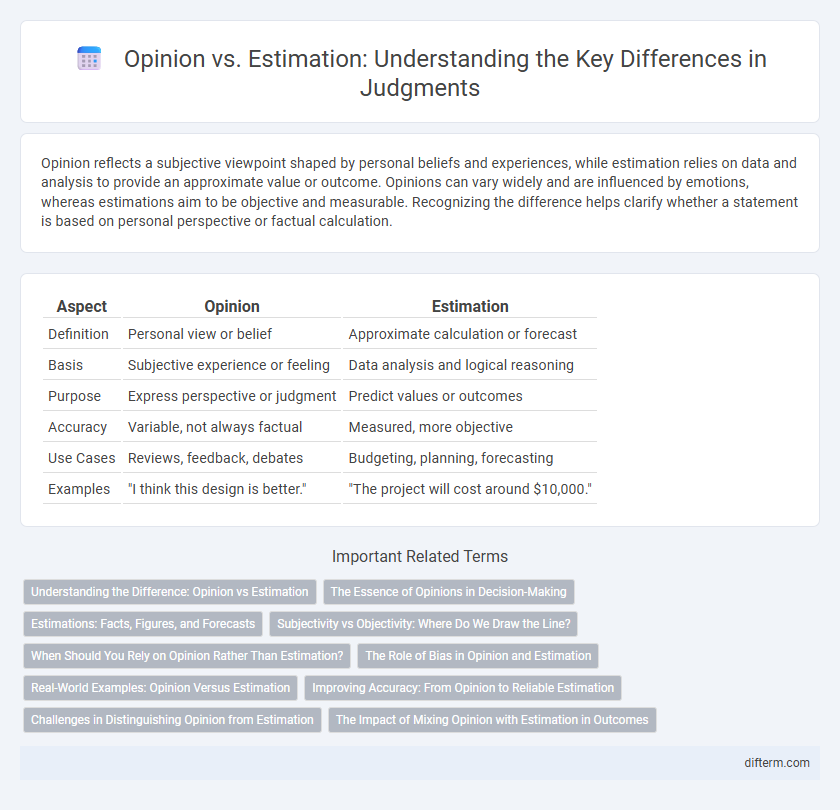Opinion reflects a subjective viewpoint shaped by personal beliefs and experiences, while estimation relies on data and analysis to provide an approximate value or outcome. Opinions can vary widely and are influenced by emotions, whereas estimations aim to be objective and measurable. Recognizing the difference helps clarify whether a statement is based on personal perspective or factual calculation.
Table of Comparison
| Aspect | Opinion | Estimation |
|---|---|---|
| Definition | Personal view or belief | Approximate calculation or forecast |
| Basis | Subjective experience or feeling | Data analysis and logical reasoning |
| Purpose | Express perspective or judgment | Predict values or outcomes |
| Accuracy | Variable, not always factual | Measured, more objective |
| Use Cases | Reviews, feedback, debates | Budgeting, planning, forecasting |
| Examples | "I think this design is better." | "The project will cost around $10,000." |
Understanding the Difference: Opinion vs Estimation
Opinion reflects personal beliefs or judgments influenced by individual experiences and emotions, lacking empirical validation. Estimation involves calculating or approximating a value based on data, analysis, or logical reasoning, aiming for objective accuracy. Distinguishing between the two is crucial for decision-making, as estimations provide measurable insights while opinions offer subjective perspectives.
The Essence of Opinions in Decision-Making
Opinions serve as subjective insights shaped by personal experiences and beliefs, playing a crucial role in decision-making by providing diverse perspectives that enrich problem-solving processes. Unlike estimations, which rely on objective data and predictive analysis, opinions offer nuanced understanding that can address uncertainties where quantitative information is limited. Emphasizing the essence of opinions highlights their influence in guiding choices, fostering creativity, and supporting adaptive strategies in complex scenarios.
Estimations: Facts, Figures, and Forecasts
Estimations involve the use of facts, figures, and forecasts to predict future outcomes or assess current conditions with measurable data. They rely on quantitative analysis, statistical models, and empirical evidence to provide a grounded perspective that goes beyond subjective judgment. Unlike opinions, estimations offer a more objective basis for decision-making by incorporating verifiable information and trend projections.
Subjectivity vs Objectivity: Where Do We Draw the Line?
Opinion reflects subjective perspectives shaped by personal beliefs, emotions, and experiences, while estimation relies on objective data and measurable criteria to predict or evaluate outcomes. The line between them blurs when subjective interpretations influence supposed estimates, challenging the clarity of purely objective analysis. Understanding this distinction is crucial for effective decision-making and clear communication in fields ranging from science to everyday judgment.
When Should You Rely on Opinion Rather Than Estimation?
Rely on opinion when you need qualitative insights or expert judgment that cannot be quantified, especially in ambiguous situations or early project phases. Estimation suits scenarios requiring numerical predictions or measurable outcomes based on data and past experiences. Understanding the strengths of each approach ensures better decision-making by blending subjective perspectives with objective analysis.
The Role of Bias in Opinion and Estimation
Bias significantly influences both opinion and estimation by shaping individual perceptions and judgments based on prior beliefs or experiences. In opinion formation, cognitive biases such as confirmation bias lead individuals to favor information that supports their existing views, skewing objectivity. Estimation processes are also affected by biases like anchoring, where initial information unduly impacts numerical assessments, resulting in systematic deviations from accuracy.
Real-World Examples: Opinion Versus Estimation
Opinion reflects personal beliefs or viewpoints, often influenced by emotions and individual experiences, such as favoring a particular brand based on past satisfaction. Estimation relies on data, analysis, and measurable evidence, exemplified by predicting sales growth using market trends and statistical models. Real-world examples clarify the distinction: a customer's opinion about a restaurant contrasts with a financial analyst's estimation of its annual revenue.
Improving Accuracy: From Opinion to Reliable Estimation
Shifting from opinion to reliable estimation improves accuracy by grounding conclusions in data-driven analysis rather than subjective beliefs. Reliable estimation employs statistical methods and empirical evidence, reducing bias and increasing predictive validity. This transition enhances decision-making processes by providing quantifiable metrics instead of uncertain personal viewpoints.
Challenges in Distinguishing Opinion from Estimation
Distinguishing opinion from estimation poses significant challenges due to their inherent subjectivity and overlapping characteristics, often leading to ambiguity in interpretation. Opinions are influenced by personal beliefs and values, while estimations rely on data analysis and probabilistic reasoning, yet both can be expressed with similar levels of confidence. Misidentifying one for the other can impact decision-making accuracy, emphasizing the need for clear criteria and contextual understanding in communication and evaluation.
The Impact of Mixing Opinion with Estimation in Outcomes
Mixing opinion with estimation often distorts decision-making by introducing subjective bias into objective forecasts, reducing the accuracy of outcomes. Estimations rely on data-driven analysis and probabilistic models, while opinions are influenced by personal beliefs and experiences, leading to inconsistencies. Clarity in separating opinion from estimation enhances predictive reliability and supports more effective strategic planning.
opinion vs estimation Infographic

 difterm.com
difterm.com